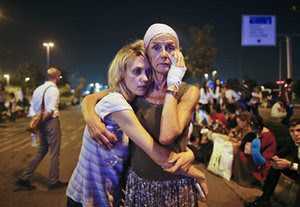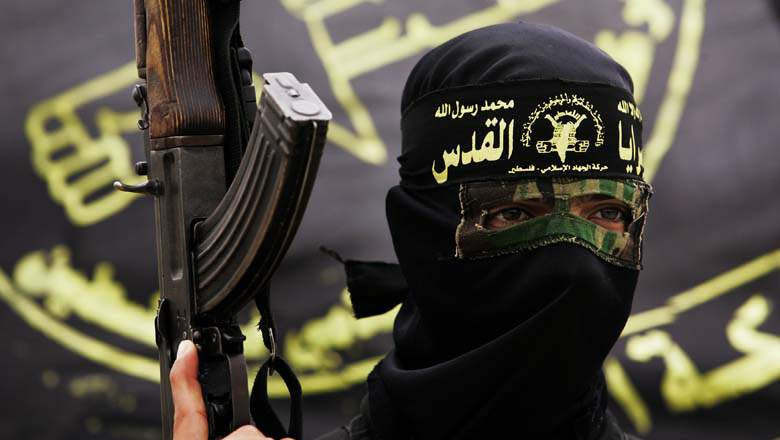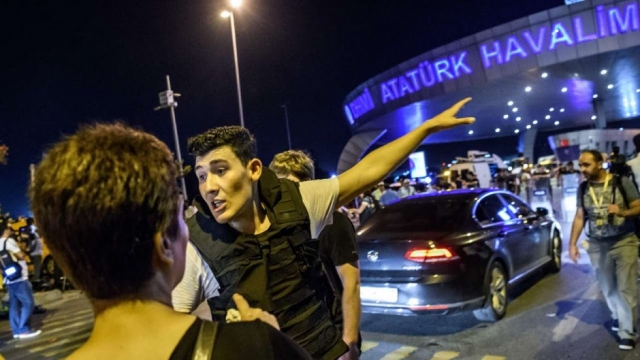Triple Suicide Attack Kills 41, Wounds 239 at Istanbul Airport
ISTANBUL – In a brazen coordinated attack on Istanbul’s Ataturk Airport, three suicide bombers killed at least 41 people and wounded more than 239 others late Tuesday.
The attackers, armed with Kalashnikov assault rifles and wearing explosive devices strapped to their bodies, began opening fire near an entry point at one of the airport’s arrival terminals at just after 9 pm before detonating their suicide vests after Turkish police began firing in their direction.
Eyewitnesses said two of the attackers entered the international arrivals hall and immediately began opening fire. The third bomber reportedly remained outside at the terminal’s car park, Turkey's Justice Minister Bekir Bozdag said in the aftermath of the attack.
According to investigators, the three fired their guns into the crowd before setting off the explosive devices.
CCTV footage from inside the terminal showed dozens of terrified people fleeing one of the gunmen before an explosion engulfs the hall in a bright orange flash.
Additional footage shared on social media showed another explosion only seconds after police officers fired on and wounded one of the attackers.
The three suicide attackers are believed to have arrived at the airport – one of Europe’s largest with more than 61 million visitors per year – by taxi and were able to launch the attack without going through security checks, according to preliminary police reports.

Situated 22 kilometers from Istanbul’s city center, on the European side of the Bosphorus, Ataturk Airport has long been considered a soft target for the various terrorist groups that operate in Turkey.
Security checks inside the airport’s departure and transfer halls are often thorough and include full body and luggage scans, as well as additional questioning by security officials. X-ray scanners are present at the far less highly patrolled arrivals terminal and security checks for cars are limited.
Turkish Prime Minister Binali Yildirim announced early Wednesday that preliminary indicators suggest that the Islamic State (ISIS) was likely behind the attack.
“Based on the analyses of our security forces, the first indications point to Daesh (the commonly used Arabic acronym for ISIS) as the perpetrators,” Yildirim said during a press conference at the airport. “What is noteworthy is that this attack came at a time when our country is putting up a merciless fight against separatist terrorism and recording significant success.”
There was no immediate claim of responsibility by ISIS or any other of their affiliated groups in the region.
Officials in Turkey have been quick to blame recent attacks on ISIS or, more often, Kurdish separatists based in the country’s volatile south-east as well as in northern Iraq and Syria.
Turkish President Recep Tayyip Erdogan referred to the attack as a turning point in the global fight against militant groups.
“The bombs that went off in Istanbul today could have gone off in any city in the world. I want everyone to understand that, to the terrorists, there is no difference between Istanbul and London, Ankara and Berlin, Izmir and Chicago. Unless we come together and fight against terrorism, we can’t dare imagine what comes next,” an indignant Erdogan said in a televised address.
Worldwide Condemnation and Calls for Fight Against Terror
International condemnation of the attack has been swift, with United Nations Secretary-General Ban Ki-moon calling for the perpetrators to be immediately identified and brought to justice.
US President Barack Obama issued a statement through the White House press office saying, “Ataturk International Airport, like Brussels Airport, which was attacked earlier this year, is a symbol of the international connections that bind us together. Our deepest condolences go out to the families and loved ones of those killed, and we wish a speedy recovery to those injured. We remain steadfast in our support for Turkey, our NATO ally and partner, along with all of our friends and allies around the world, as we continue to confront the threat of terrorism."
Embattled UK Prime Minister David Cameron – who is currently dealing with his own crisis after Britain shocked the world by voting to leave the EU – called the terrorist attack a "hideous crime".
Cameron said the UK would continue to work with the other countries after the Brexit vote " to keep our countries and people safe – and it's particularly important to say that tonight again when there has been another hideous terrorist attack in Turkey".
NATO General-Secretary Jens Stoltenberg also offered his condolences, saying the Western military alliance stands in solidarity with key member Turkey.
French President Francois Hollande offered his thoughts in an interview with the Voice of America saying, “As I have unfortunately had to do before, I strongly condemn the attack and stress that we need to make sure that we know exactly who the perpetrators are so we can do anything possible to fight against terrorism.”
Germany’s Foreign Minister Frank-Walter Steinmeier also condemned the attacks, saying, “We in Germany grieve for the victims and their relatives. We stand by Turkey.”
The Pakistani Foreign Office issued a statement early Wednesday morning, calling the attack “a mindless act of brutal terrorism”.
Turkey’s ambassador to Georgia, Zeki Levent Gumrukcu, told GEORGIA TODAY “Messages of solidarity and condemnation by Georgian officials have flooded into the embassy. Prime Minister (Giorgi) Kvirikashvili was among the very first to condemn the attack and express full solidarity with the Turkish government and people,” he said.
“President (Giorgi) Margvelashvili and Foreign Minister (Mikheil) Janelidze also expressed their condolences…and messages of support are pouring in from all corners of Georgian society. This is a true show of friendship and solidarity that makes us even more confident that terrorism will not achieve its objectives.”
Narendra Modi, India’s Prime Minister, also offered his condolences via Twitter, “The attack in Istanbul is inhuman & horrific. I condemn it strongly. My thoughts are with the bereaved families. May the injured recover quickly.”
Casualty Details Constantly Revised as Security Measures Increase
According to reports by Agence-France Presse, two police officers are among the dead.
At least 24 Turkish nationals and 13 foreign citizens were killed in the attack, according to Yildirim.
Additional details about the nationalities of those killed and injured were still emerging throughout Wednesday, but Turkish officials said five Saudis, two Iraqis and one each from Iran, Ukraine, China, Tunisia, Uzbekistan, Jordan and the Palestinian-controlled West Bank were among the dead. The Kingdom of Saudi Arabia's Embassy said at least seven more of their citizens were seriously injured in the attack.
All flights at the airport were suspended immediately after the attack. The United State’s Federal Aviation Administration initially grounded all services between the US and Istanbul, but the stoppage was later lifted.
According to Turkey’s Dogan news agency, a plane carrying Albanian Prime Minister Edi Rama was landing at Istanbul’s Ataturk airport for an official visit when the attack occurred. Rama and his entourage were taken safely to an official residence and shuttled onward to Turkey’s capital, Ankara.
Most flights have now resumed at the airport, but information boards showed about one-third had been cancelled, with many delays, the BBC reported.
Iran, however, announced that it had indefinitely suspended all flights to and from Ataturk Airport until further notice, according to Reza Jafarzadeh, director of public relations at Iran's Civil Aviation Organization.
Gumrukcu said in an e-mail to GEORGIA TODAY that additional security measures are being put in place at the airport as well as in Istanbul’s more heavily trafficked areas and praised the conduct of the city police.
“Turkish authorities are reviewing all possible steps to further increase the security in and around the airport, as well as in other public places. But it should also be noted in terms of the physical security of the airport; there was no real gap. The attackers were stopped at the main entrance of the terminal, and a higher death toll was prevented due to the timely intervention of Turkish police officers,” Gumrukcu said.
GT’s Analysis: Finding a Motive in Turkey’s Annus Horribilis
Tuesday’s attack is the tenth deadly incident to have rocked Turkey in just over a year. Nearly 300 people have been killed and up to 2,400 more wounded in a series of car bomb and suicide attacks since April 2015.
The Turkish government has blamed Kurdish separatists and, to a lesser extent, ISIS for the attacks.
Erdogan has been a reluctant ally of the US-led coalition’s fight against ISIS in Iraq and Syria, often refusing to take part in combat operations aimed at destroying the militant group.
Turkey has instead allocated most of its military operations against various Kurdish separatist groups that are locked in an intense fight against both ISIS and the Turkish government.
Ankara resumed hostilities with its main advisory the Kurdistan Workers Party (PKK) after a two-year ceasefire collapsed in recent months. The PKK are Kurdish separatists that have been in an armed struggle with the Turkish government since the mid-1980s. The group has long been considered a terrorist organization by Ankara and the greatest threat to Turkey’s national security.
Erdogan and the Turkish government have consistently claimed that the PKK and their Kurdish allies in Syria – the YPG – are actively cooperating with one another to carve out a separate Kurdish state made up of regions from southeastern Turkey and the Upper Mesopotamian Plain in Iraq and Syria.

The likelihood that the PKK or other Kurdish groups carried out the attack remains remote, based on the target in question.
Kurdish separatists tend to target military and security installations instead of purely civilian targets as they are of more strategic and symbolic importance to the Kurds.
A Kurdish separatist group – the Kurdistan Freedom Falcons – claimed responsibility for an attack on June 9 when it blew up a bus carrying riot police in the center of Istanbul that left 11 security officers dead.
The lack of an immediate claim by ISIS is not surprising. The group rarely makes a public statement about attacks carried out against Turkey. The style of the attack, however, points to ISIS or an affiliated group as it targeted a civilian facility where it can inflict dozens of casualties on an equal number of nationalities.
The modus operandi of ISIS affiliates and other militant groups is to target multinational assets, particularly those with light or porous security checks. Similar small groups of armed men dressed in black and marauding through public spaces were responsible for recent attacks in both Paris and Brussels. In each case, the perpetrators had sworn allegiance to ISIS or other Islamist groups.
The timing of the attack may be key to deciphering who was responsible. Turkish officials are quick to blame ISIS, but a certain degree of scepticism may cloud Ankara’s claim.
Erdogan, who has come under criticism for his autocratic rule and severe rollback of secular institutions in Turkey, has been reluctant to combat the militant group or consider it an existential threat on par with the PKK.
His ambivalence towards the rise of Islamist rebels in Syria and his frequent references to ISIS and the PKK as equals has been sharply criticized by most governments in the region and the West.
Turkey’s open support for Islamist groups fighting in the Syrian Civil War has come under fire from the US, UK, EU, Iran and Jordan. According to Germany’s BND intelligence service and the CIA, the Turks have done little to stem the tide of jihadist volunteers who cross the Turkish-Syrian border to join Sunni militant groups that include Jabhat al-Nusra, Ahrar al-Sham and the now-defunct Muhajireen Brigade, the latter of which was made up almost entirely of volunteers from the North and South Caucasus.
The groups, along with Turkey, are bitter enemies of Syria’s Shi’a dictator Bashar al-Assad. They had scored significant victories against the regular Syrian Army since the start of the war.
Once Russian President Vladimir Putin decided to intervene on the side of close ally Assad, both Islamist groups became the main target of Moscow’s intense bombing campaign that began in October 2015. The Russian Air Force has inflicted heavy casualties on both al-Nusra and al-Sham, helping Assad’s forces recapture most of the territory they had lost to opposition forces in the last four years.

Ankara’s support for groups battling Assad peaked when the Turkish Air Force shot down a Russian Su-24 fighter-bomber in November 2015, killing one the pilots. The incident caused a major rift between Putin and Erdogan – who had previously been on exceptionally warm terms due to their similar personalities and anti-Western rhetoric – that led to a ban on Russian citizens travelling to Turkey and reciprocal sanctions on each countries’ products.
Moscow’s actions severely strained Turkey’s reeling economy, which counts tourism and exports as its main sources of revenue.
Putin demanded a personal apology, which had been flatly rejected by Erdogan until earlier in the week when he phoned the Kremlin to offer his personal condolences and regret over the November incident.
Erdogan's sudden apology to Putin and recent rapprochement with Israel after years of frozen relations is a major shift in his foreign policy priorities. His support for Islamic militant group Hamas, coupled with an incident where Israeli commandos raided a Turkish blockade runner after it attempted to enter Hamas' stronghold in the Gaza Strip left several Turkish and Israeli citizens dead, severed relations between the one-time close allies for the better part of a decade.
Ankara's move to normalize relations with Egyptian President Abdel el-Sisi – a man whose presidency Erdogan has described as illegitimate – sent further signals that Erdogan's growing diplomatic isolation from the EU and US was taking precedent over his close ties to groups like Hamas and Egypt's ousted Muslim Brotherhood.
Erdogan's sudden about-face towards Russia and Israel may have led to a backlash from the same extremist groups Erdogan once supported.
By Nicholas Waller
Photos: AP, AFP, Reuters, Getty Images












